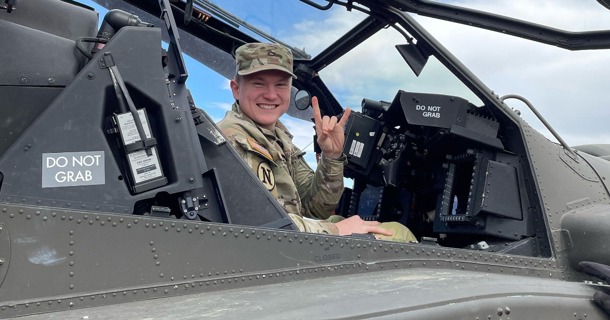Leading the Way: UNK ROTC program prepares students for success in the military and beyond

KEARNEY – They share the same campus experience as most college students – lectures, late-night study sessions, morning coffee runs and meetups with friends.
But for members of the University of Nebraska at Kearney’s Reserve Officers’ Training Corps, each day also carries a deeper purpose: preparing to serve and lead others.
For this tight-knit group of cadets, ROTC isn’t just a class – it’s a calling.
“It’s really a family environment,” said Lacy Biltoft, a nursing student from Holdrege. “We’re a one-of-a-kind group of people. We all have our own experiences, but we share that common mindset and grounding that brings us closer together.”
An opportunity for everyone
Part of UNK’s College of Business and Technology, the ROTC program combines military science courses with leadership, communication and organizational training open to students from any major.
Twenty-three cadets are currently enrolled, studying fields as varied as aviation, business administration, health care, education and exercise science. Some plan to pursue active-duty service after graduation; others will have part-time positions in the Army National Guard or Reserve while beginning their civilian careers.
Students who commit to the program are commissioned as Army officers upon graduation, stepping immediately into leadership roles overseeing 20 to 40 soldiers.
But that’s not a requirement. ROTC courses are also available as general education electives, allowing students to take them simply for the skills they teach.
“You can take ROTC and not have any obligation whatsoever to the Army,” said Capt. Cannon Marchand. “Above all else, ROTC is a leadership class – a chance to learn how to bring value to an organization, how to be a better follower of your leaders and how to be a better leader of your peers. It’s three credit hours a semester focused on leadership, teamwork and communication.”
A Kearney native, Marchand completed the ROTC program while attending UNK and earning a degree in history. After graduating in 2019, he worked for the Federal Reserve in Omaha and served in the Nebraska Army National Guard before returning to his alma mater earlier this year to oversee the program that helped shape his career.
“It’s definitely really rewarding to come back to a program that I gained a lot of leadership and business organizational skills from and lead it,” said Marchand, a full-time instructor through the National Guard.
UNK’s program is now primarily supported through the Nebraska Army National Guard – a model that keeps instruction local while maintaining the same federally set curriculum used nationwide. Cadets can earn scholarships covering tuition or room and board, receive stipends for books and living expenses and graduate with little to no debt.
“This is a great opportunity to have most of your college paid for and have a part-time or full-time job lined up while you’re still in school,” Marchand said.
Pushing limits, finding purpose
ROTC and the National Guard were part of Biltoft’s plans long before she arrived on campus.
“I knew I wanted to join ROTC before I even came to college,” she said. “I have a lot of family members in the National Guard, so that’s always interested me. I want to hold myself to that higher standard and give myself those opportunities. I knew it would be challenging, but I really wanted to push myself, and it’s made me a better person in so many ways.”
Biltoft serves as a combat medic with the Nebraska Army National Guard’s 2nd Battalion, 134th Infantry Regiment – an airborne infantry unit based in Bellevue. Her military benefits and ROTC scholarship cover all her college expenses.
“I get paid to go to school through these programs, which is a big part of how I’m able to attend nursing school,” said Biltoft, who’s in her second semester at the University of Nebraska Medical Center in Kearney. “Money isn’t a huge stressor for me, so I’m able to focus more on my education.”
This past summer, Biltoft completed ROTC Advanced Camp at Fort Knox, Kentucky, where she ranked among the top 35% of roughly 7,000 cadets nationwide. The 35-day training program tests and develops cadets’ leadership, tactical and problem-solving skills through activities such as land navigation, marksmanship, rappelling, field training exercises and the Army Combat Fitness Test before they commission as officers.
She also completed a nursing internship at Martin Army Community Hospital in Georgia, gaining 160 hours of hands-on clinical experience.
“It was amazing,” Biltoft said. “All military hospitals are teaching hospitals, so they want you to learn. I had the opportunity to shadow military officers, work alongside them and perform interventions and patient care that I don’t think I would necessarily get through regular clinicals.”
Biltoft plans to continue her service through the Army Nurse Corps, eventually earning her nurse practitioner license and specializing in emergency or flight nursing.
“During my summer internship, I fell in love with the active-duty nursing side,” she said. “That’s really what I want to do.”
She credits ROTC with transforming her both personally and professionally. The program taught her discipline, time management and how to lead with empathy – lessons she applies daily while juggling nursing school, a part-time job and her leadership duties within ROTC.
“It gave me something to work for and opened so many doors,” she said. “I can’t just think about myself anymore. I have to think about the people under me, and that’s really going to translate to the workforce.”
Reaching new heights
Like Biltoft, Max Kahland has discovered that ROTC is more than a college program – it’s a place to grow, lead and form lifelong connections.
A senior from Johnson, he joined the Nebraska Army National Guard right after high school, completing basic training and advanced individual training before enrolling at UNK.
“I wanted to try it out, and I quickly fell in love with it – mostly for the people,” he said. “All of my best friends are from the ROTC program. The cadre and the support we have here really make it an awesome experience.”
Now in his fourth year, Kahland helps lead the program by organizing tactical labs, training exercises and physical fitness tests. It’s a demanding role, but one he embraces.
“Every minute I spend on ROTC, whether it’s planning or actually executing, is something I really enjoy,” he said. “Getting to mentor freshmen and sophomores and watch them develop has been awesome.”
Kahland currently serves with the 1st Battalion, 376th Aviation Regiment based in Grand Island, combining his military duties with his aviation systems management major at UNK. His interest in this area deepened after joining the unit.
“When I got to go on flights on Black Hawks and Chinooks and Lakotas and see how they operate, that’s where I really found my love for aviation,” he said.
His ROTC journey has also taken him far beyond the classroom. Kahland completed Air Assault School at Fort Campbell, Kentucky, learning helicopter operations and rappelling techniques, and Airborne School at Fort Benning, Georgia, where he parachuted from a C-130 military transport aircraft. He ranked fourth out of the approximately 7,000 cadets during ROTC Advanced Camp last summer.
“Being down there and seeing how my level of training compared to other cadets made me realize how good of a program we have here at UNK,” he said.
After completing his degree in spring 2026, Kahland plans to continue serving in the National Guard while pursuing a career in aviation operations. Eventually, he hopes to earn his airframe and powerplant certification and work as an aircraft mechanic.
Originally joining the Guard to help pay for college – he’ll graduate debt-free – Kahland now sees it as much more than financial support.
“I always knew I wanted to serve,” he said. “Since I was young, that’s something I’ve been interested in. The Guard gave me a way to do that while getting my degree.”
He encourages other students to explore ROTC for themselves – not just for the career path it offers, but for the community it builds.
“Instead of just diving straight into military service, ROTC gives you a chance to test it out and see if you like it before committing,” he said. “If you’re looking for a way to transition into college and make friends, this program is great for that, too.”
Army ROTC is available at hundreds of colleges and universities across the country. The UNK program first launched in 1969 and, after a brief hiatus, was reinstated in 2008. Since its return, approximately 65 officers have commissioned through the UNK program.
Marchand hopes to see continued growth in the years ahead.
“We’d love to expand to 30 cadets or more,” he said. “Our goal is to show students that whether they pursue the military full time or part time, the leadership experience they gain here will serve them for the rest of their lives.”hoto)
